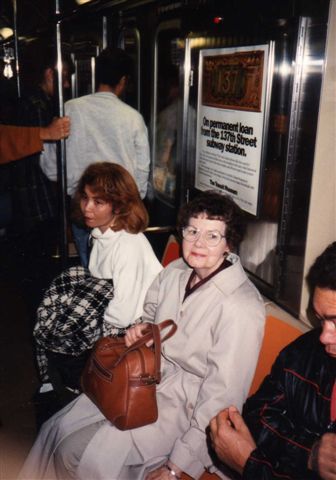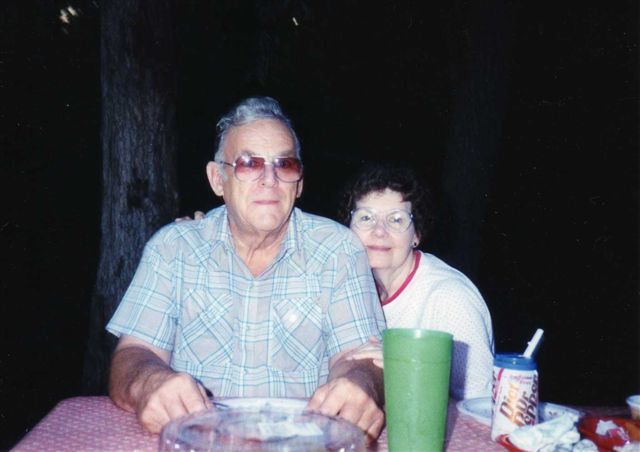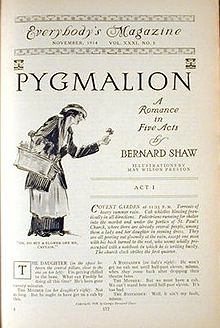My brother, who became the unofficial Teachout family archivist by virtue of the fact that he lived so close to (and is now moving into) the house where we grew up, just sent me an e-mail containing snapshots of my mother and father. Some of them I remember vividly, while others were unfamiliar to me. All of them moved me, some to tears.
In recent weeks I’ve been thinking about my parents with increasing frequency, no doubt because the success of Satchmo at the Waldorf makes me wish that they’d lived to see it–though I wouldn’t have wanted to try to explain to my mother why I’d put such spectacularly obscene language in the mouth of her beloved Louis Armstrong! Be that as it may, it’s nice to be able to get a look at them again, and I thought it might possibly amuse you to see two of my favorite photos:
 • I took this one shortly after my parents came to New York for their first and only joint visit in 1983 or 1984. It documents my mother’s first subway ride. If memory serves, we were headed down to Rockefeller Center. Even at its best, the New York subway system can be a formidable obstacle course for anyone who’s spent the whole of his life in a series of small Midwestern towns, and I have crystal-clear memories of the morning that I escorted my mother down the steps and into the maelstrom.
• I took this one shortly after my parents came to New York for their first and only joint visit in 1983 or 1984. It documents my mother’s first subway ride. If memory serves, we were headed down to Rockefeller Center. Even at its best, the New York subway system can be a formidable obstacle course for anyone who’s spent the whole of his life in a series of small Midwestern towns, and I have crystal-clear memories of the morning that I escorted my mother down the steps and into the maelstrom.
Though she was palpably nervous, she was also a plucky woman who rarely let anything faze her, and this tight-lipped portrait of a middle-aged woman determined not to display her anxiety has never failed to put a smile on my own face.
•  My father, like so many men of his generation, loved to go “camping,” by which he meant staying somewhere other than home in something other than a motel room. First he bought a tent, then a trailer, then a mobile home on Kentucky Lake, then–dream of dreams–a full-fledged motor home, and each summer he did his level best to get out of town as often as possible.
My father, like so many men of his generation, loved to go “camping,” by which he meant staying somewhere other than home in something other than a motel room. First he bought a tent, then a trailer, then a mobile home on Kentucky Lake, then–dream of dreams–a full-fledged motor home, and each summer he did his level best to get out of town as often as possible.
Needless to say, it was always taken for granted that my mother would come along, since he was incapable of functioning without her. (It would have been unimaginably awful had she predeceased him.) Alas, she hated the camping trips that made him so happy, but she was a loyal and devoted spouse, and on occasion she somehow contrived to enjoy herself. This picture was taken on one of those happy occasions.
Oh, how I miss them both.
Archives for November 20, 2012
TT: A Shavian romp
I was the guest host last night for Project Shaw‘s concert-style reading of Pygmalion at the Players Club. Since critics are officially “not present” at Project Shaw productions, I speak purely as a civilian when I say that it was one of the most enjoyable presentations of a play by George Bernard Shaw that I’ve ever seen. David Staller’s bone-simple staging was deft and quick, and the actors played their parts with tremendous gusto. I regret to confess that this is my first evening with Project Shaw, but it definitely won’t be my last.
Next up: Saint Joan, on December 17. Don’t miss it.
If you’re curious, here’s what I had to say. Regular readers of this blog may notice that I lifted part of my introductory remarks from a recent Wall Street Journal “Sightings” column. Nobody noticed, so don’t tell!
* * *
It’s a pleasure to be here, and to talk about Shaw, an artist whom I admire greatly in spite of the fact that we have, so far as I know, only one thing in common. Like him, I’m now a critic and a playwright. Now that I’ve worked both sides of the proscenium, I know better than ever before that there are many things about the theater that can’t be learned from an aisle seat! I think I’m a better critic for having written a play and two opera libretti, and I dare say that Shaw might well have become a better playwright for having spent time as a working critic. At any rate, he certainly knew how seriously to take his reviews!
 But enough about me–a sentence that Shaw, so far as I know, never spoke in his life. Let’s talk about Pygmalion for a moment. Nowadays most theatergoers know Eliza Doolittle and Henry Higgins from My Fair Lady, in which Lerner and Loewe sprinkled sugar all over Shaw’s greatest comedy. The real Pygmalion, by contrast, is a double-edged satire of the British class system that takes no less cutting a view of the progressive reformers who, like Shaw himself, sought and seek to flatten it out. He shows us that Professor Higgins, like so many of his well-meaning kind, prefers people in the mass to individual human beings. He treats Eliza like a lab rat, not a creature of flesh and blood, and her scornful dismissal of his high-minded heartlessness rings as true today as it did in 1913.
But enough about me–a sentence that Shaw, so far as I know, never spoke in his life. Let’s talk about Pygmalion for a moment. Nowadays most theatergoers know Eliza Doolittle and Henry Higgins from My Fair Lady, in which Lerner and Loewe sprinkled sugar all over Shaw’s greatest comedy. The real Pygmalion, by contrast, is a double-edged satire of the British class system that takes no less cutting a view of the progressive reformers who, like Shaw himself, sought and seek to flatten it out. He shows us that Professor Higgins, like so many of his well-meaning kind, prefers people in the mass to individual human beings. He treats Eliza like a lab rat, not a creature of flesh and blood, and her scornful dismissal of his high-minded heartlessness rings as true today as it did in 1913.
I think that much of Shaw’s effectiveness as a dramatist of ideas inhered in his absolute willingness to give the devil his due, and I think that Pygmalion might just be the best example of that willingness. But Shaw was no less alive to the contradictions in his own nature than to those in his characters, most of whom are mirrors in which bits and pieces of their creator are vividly reflected. Instead of making love, they talk rings around it–even the ones who long most for intimacy. They believe in rationality, but embrace the apocalypse of total war with a pathetic blend of ecstasy and relief, just like Shaw, who opposed British involvement in World War I but was himself a power-worshipper with a totalitarian itch who believed passionately in human perfectibility. And though they joke and joke and joke, they’re always kidding on the square, telling their brutal truths with such impish charm that you scarcely feel the knife slipping in until the blood starts to flow.
That is Shaw in a nutshell. He is a serious comedian, an artist who knows that in most human lives, absurdity and sorrow are woven together too tightly to be teased apart–and that it is comedy, not tragedy, which illustrates that fact most fully. Life is too complex to be painted solely in shades of black. Even as Shakespeare made room in Lear for the Fool, so does Shaw make room in his theatrical sermons for the pungent humor that, as Henry James so truly said, is the saving salt. So tonight, let us laugh with him…and at ourselves.
* * *
George Bernard Shaw on capital punishment:
TT: Lookback
 From 2003:
From 2003:
I’ve lived in New York for the better part of two decades now, and you’d think I’d have gotten used to it. In a way, I suppose I have, but even now all it takes is a whiff of the unexpected and I catch myself boggling at that which the native New Yorker really does take for granted. As for my visits to Smalltown, U.S.A., they invariably leave me feeling like yesterday’s immigrant, marveling at things no small-town boy can ever really dismiss as commonplace, no matter how long he lives in the capital of the world….
Read the whole thing here.
TT: Almanac
“Always they had been anti-Semite, always the sinews of any absolutism.”
William Haggard, Venetian Blind
